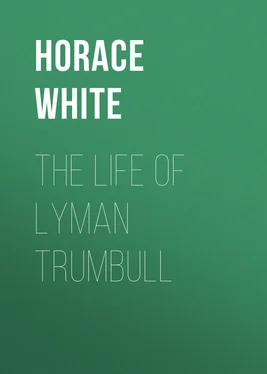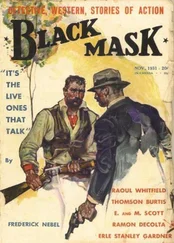Horace White - The Life of Lyman Trumbull
Здесь есть возможность читать онлайн «Horace White - The Life of Lyman Trumbull» — ознакомительный отрывок электронной книги совершенно бесплатно, а после прочтения отрывка купить полную версию. В некоторых случаях можно слушать аудио, скачать через торрент в формате fb2 и присутствует краткое содержание. Жанр: foreign_prose, История, foreign_edu, foreign_antique, на английском языке. Описание произведения, (предисловие) а так же отзывы посетителей доступны на портале библиотеки ЛибКат.
- Название:The Life of Lyman Trumbull
- Автор:
- Жанр:
- Год:неизвестен
- ISBN:нет данных
- Рейтинг книги:5 / 5. Голосов: 1
-
Избранное:Добавить в избранное
- Отзывы:
-
Ваша оценка:
- 100
- 1
- 2
- 3
- 4
- 5
The Life of Lyman Trumbull: краткое содержание, описание и аннотация
Предлагаем к чтению аннотацию, описание, краткое содержание или предисловие (зависит от того, что написал сам автор книги «The Life of Lyman Trumbull»). Если вы не нашли необходимую информацию о книге — напишите в комментариях, мы постараемся отыскать её.
The Life of Lyman Trumbull — читать онлайн ознакомительный отрывок
Ниже представлен текст книги, разбитый по страницам. Система сохранения места последней прочитанной страницы, позволяет с удобством читать онлайн бесплатно книгу «The Life of Lyman Trumbull», без необходимости каждый раз заново искать на чём Вы остановились. Поставьте закладку, и сможете в любой момент перейти на страницу, на которой закончили чтение.
Интервал:
Закладка:
10
The following correspondence passed between them:
Springfield, March 4, 1843.
Lyman Trumbull, Esq.,
Dear Sir: It is my desire, in pursuance of the expressed wish of the Democracy, to make a nomination of Secretary of State, and I hope you will enable me to do so without embarrassing myself. I am most respectfully,
Your obedient servant,
Thomas Ford.
Springfield, March 4, 1843.
To His Excellency, Thomas Ford:
Sir,—In reply to your note of this date this moment handed me, I have only to state that I recognize fully your right, at any time, to make a nomination of Secretary of State.
Yours respectfully, Lyman Trumbull.11
American Notes , chap. xiii. The reason why horses were more precious than human life was that when the frontier farmer lost his work-team, he faced starvation. Both murder and horse-stealing were then capital offenses, the latter by the court of Judge Lynch.
12
Mr. Morris St. P. Thomas, a close friend of Trumbull in his latter years, a member of his law office, and administrator of his estate, made the following statement in an interview given at 107 Dearborn Street, Chicago, June 13, 1910: "Judge Trumbull once told me that he had never in his life given a promissory note. 'But you do not mean,' said I, 'that in every purchase of real estate you ever made you paid cash down!' 'I do mean just that,' the Judge replied. 'I never in my life gave a promissory note.'"
13
These facts are detailed in a paper contributed to the Illinois State Historical Society in 1908 by Joseph B. Lemen, of O'Fallon, Illinois.
14
Negro Servitude in Illinois , by N. Dwight Harris, p. 108.
15
The Journal of the Illinois State Historical Society for October, 1912, contains an autobiography of Stephen A. Douglas, of fifteen pages, dated September, 1838, which was recently found in his own handwriting by his son, Hon. Robert M. Douglas, of North Carolina. It terminates just before his first campaign for Congress.
16
Cong. Globe , July, 1856, Appendix, p. 712.
17
Letter to the Missouri Democrat , dated March 1, 1856, quoted in P. Ormon Ray's Repeal of the Missouri Compromise , p. 232.
18
Some testimony as to the effect produced upon Douglas himself by this speech was supplied to me long afterwards from a trustworthy quarter in the following letter:—
New York, Dec. 7, 1908.
My dear Mr. White:
In 1891, at his office in Chicago, Mr. W. C. Gowdy told me that Judge Douglas spent the night with him at his house preceding his debate with Mr. Lincoln; that after the evening meal Judge Douglas exhibited considerable restlessness, pacing back and forth upon the floor of the room, evidently with mental preoccupation. The attitude of Judge Douglas was so unusual that Mr. Gowdy felt impelled to address him, and said: "Judge Douglas, you appear to be ill at ease and under some mental agitation; it cannot be that you have any anxiety with reference to the outcome of the debate you are to have with Mr. Lincoln; you cannot have any doubt of your ability to dispose of him."
Whereupon Judge Douglas, stopping abruptly, turned to Mr. Gowdy and said, with great emphasis: "Yes, Gowdy, I am troubled over the progress and outcome of this debate. I have known Lincoln for many years, and I have continually met him in debate. I regard him as the most difficult and dangerous opponent that I have ever met and I have serious misgivings as to what may be the result of this joint debate."
These in substance, and almost in exact phraseology, are the words repeated to me by Mr. Gowdy. Faithfully yours,
Francis Lynde Stetson.Mr. Gowdy was a state senator in 1854 and his home was at or near Peoria. There was no joint debate between Lincoln and Douglas at or near Gowdy's residence, except that of 1854.
19
The following manuscript, written by one of Lincoln's supporters who was himself a member of the legislature, was found among the papers of William H. Herndon:
"In the contest for the United States Senate in the winter of 1854-55 in the Illinois Legislature, nearly all the Whigs and some of the ' anti-Nebraska Democrats ' preferred Mr. Lincoln to any other man. Some of them (and myself among the number) had been candidates and had been elected by the people for the express purpose of doing all in their power for his election, and a great deal of their time during the session was taken up, both in caucus and out of it, in laboring to unite the anti-Nebraska party on their favorite, but there was from the first, as the result proved, an insuperable obstacle to their success. Four of the anti-Nebraska Democrats had been elected in part by Democrats, and they not only personally preferred Mr. Trumbull, but considered his election necessary to consolidate the union between all those who were opposed to repeal of the Missouri Compromise and to the new policy upon the subject of slavery which Mr. Douglas and his friends were laboring so hard to inaugurate. They insisted that the election of Mr. Trumbull to the Senate would secure thousands of Democratic votes to the anti-Nebraska party who would be driven off by the election of Mr. Lincoln—that the Whig party were nearly a unit in opposition to Mr. Douglas, so that the election of the favorite candidate of the majority would give no particular strength in that quarter, and they manifested a fixed purpose to vote steadily for Mr. Trumbull and not at all for Mr. Lincoln, and thus compel the friends of Mr. Lincoln to vote for their man to prevent the election of Governor Matteson, who, as was ascertained, could, after the first few ballots, carry enough anti-Nebraska men to elect him. These four men were Judd, of Cook, Palmer, of Macoupin, Cook, of LaSalle, and Baker, of Madison. Allen, of Madison, went with them, but was not inflexible, and would have voted for Lincoln cheerfully, but did not want to separate from his Democratic friends. These men kept aloof from the caucus of both parties during the winter. They would not act with the Democrats from principle, and would not act with the Whigs from policy.
"When the election came off, it was evident, after the first two or three ballots, that Mr. Lincoln could not be elected, and it was feared that if the balloting continued long, Governor Matteson would be elected. Mr. Lincoln then advised his friends to vote for Mr. Trumbull; they did so, and elected him.
"Mr. Lincoln was very much disappointed, for I think that at that time it was the height of his ambition to get into the United States Senate. He manifested, however, no bitterness towards Mr. Judd or the other anti-Nebraska Democrats, by whom practically he was beaten, but evidently thought that their motives were right. He told me several times afterwards that the election of Trumbull was the best thing that could have happened.
"There was a great deal of dissatisfaction throughout the state at the result of the election. The Whigs constituted a vast majority of the anti-Nebraska party. They thought they were entitled to the Senator and that Mr. Lincoln by his contest with Mr. Douglas had caused the victory. Mr. Lincoln, however, generously exonerated Mr. Trumbull and his friends from all blame in the matter. Trumbull's first encounter with Douglas in the Senate filled the people of Illinois with admiration for his abilities, and the ill-feeling caused by his election gradually faded away.
"Sam C. Parks."
20
Edited by B. F. Stringfellow, author of African Slavery no Evil , St. Louis, 1854.
Читать дальшеИнтервал:
Закладка:
Похожие книги на «The Life of Lyman Trumbull»
Представляем Вашему вниманию похожие книги на «The Life of Lyman Trumbull» списком для выбора. Мы отобрали схожую по названию и смыслу литературу в надежде предоставить читателям больше вариантов отыскать новые, интересные, ещё непрочитанные произведения.
Обсуждение, отзывы о книге «The Life of Lyman Trumbull» и просто собственные мнения читателей. Оставьте ваши комментарии, напишите, что Вы думаете о произведении, его смысле или главных героях. Укажите что конкретно понравилось, а что нет, и почему Вы так считаете.












